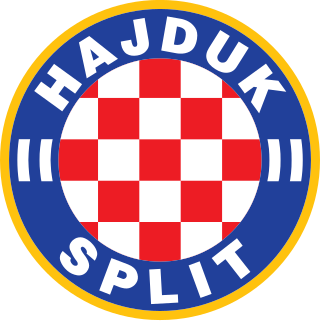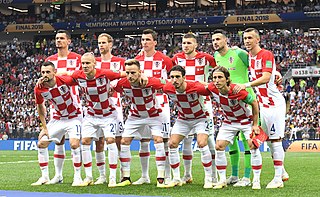
The Croatia national football team represents Croatia in international football matches. It is governed by the Croatian Football Federation (HNS), the governing body for football in Croatia. It is a member of UEFA in Europe and FIFA in global competitions. The team's colors reference two national symbols: the Croatian checkerboard and the country's tricolour. They are colloquially referred to as the Vatreni ('Blazers') and Kockasti.

The Yugoslavia national football team represented Yugoslavia in international association football.

Hrvatski nogometni klub Hajduk Split, commonly referred to as Hajduk Split or simply Hajduk, is a Croatian professional football club based in Split, that competes in the Croatian First League, the top tier in Croatian football. Since 1979, the club's home ground has been the 34,198-seater Stadion Poljud. The team's traditional home colours are white shirts with blue shorts and blue socks.

The Croatian Football Federation is the national governing body of football in Croatia. It was originally formed in 1912 and is based in the capital city of Zagreb. The organisation is a member of both FIFA and UEFA, and is responsible for overseeing all aspects of the game of football in Croatia. The current president of HNS is Marijan Kustić.

Zlatko "Cico" Kranjčar was a Croatian professional football manager and player.

Stadion u Kranjčevićevoj ulici, also known as Stadion Concordije between 1921 and 1945, is a multi-purpose stadium located in Trešnjevka neighbourhood, in the Croatian capital of Zagreb. It is mainly used for football matches and was historically the home ground of NK Zagreb until their eviction from the ground in 2018. More recently the stadium has been the home ground for Croatian First League side NK Lokomotiva. In addition, NK Rudeš use the stadium for selected matches, particularly Croatian First League games. First opened in 1921, it has undergone many renovations and facelifts, with its current layout dating back to the 1987 Summer Universiade renovation. The Croatia national football team played only once at the stadium in a 3–0 friendly game win against South Korea on 13 March 1996. With its reduced capacity from 2008, the stadium can hold 8,850 people, which makes it the second biggest stadium in Zagreb, behind Stadion Maksimir. In 2018, the stadium was refurbished with chairs installed in the eastern grandstand and a new hybrid lawn installed, leaving it with a seating capacity of 5,350 seats.
Dražan Jerković was a Yugoslav and Croatian professional football manager and player. His professional playing career spanned from 1954 to 1966, during which he played for Dinamo Zagreb and AA La Gantoise.

Nikola Jurčević is a Croatian football current manager and former player who most recently managed the Azerbaijan national team.
Marko Mlinarić is a Croatian retired footballer who played as a midfielder.
Željko Matuš is a former Croatian-Yugoslavian footballer. He was part of the Yugoslav squad that won gold at the 1960 Summer Olympics.
Ivan Šantek was a Croatian football player. He was born in Zagreb.
Aleksandar Benko was a Croatian footballer who played one game internationally for both the Yugoslavia and Croatia national teams.
Antun "Toni" Pogačnik was a Croatian footballer who played for both Yugoslavia and Croatia. He is notable for being a manager of Indonesia between 1954 and 1963 and is considered one of the best in the history of the Indonesian national football team.
On 3 June 1990, Yugoslavia hosted the Netherlands in an international friendly at Zagreb's Maksimir stadium. The match was the last preparation friendly for Ivica Osim's Yugoslavia side ahead of the 1990 FIFA World Cup in Italy. However, the contest is mostly remembered for the controversy raised due to the spectator behaviour: throughout the match, a nationalist Croat crowd of 20,000 shouted down the Yugoslav national anthem, insulted Yugoslav team players and jeered the head coach. Play on the pitch quickly became secondary as the match turned into another football-related incident reflecting ethnic tensions and rising nationalism in the Socialist Federal Republic of Yugoslavia.
On 17 October 1990 Croatia hosted the United States in an unofficial international friendly in Zagreb's Maksimir stadium. Held on the eve of the nation's independence from Yugoslavia, this was Croatia's first international match in the modern era.
Zlatko Papec was a Croatian footballer.

Građanski nogometni klub Dinamo Zagreb, commonly referred to as GNK Dinamo Zagreb or simply Dinamo Zagreb, is a Croatian professional football club based in Zagreb. Dinamo play their home matches at Stadion Maksimir. They are the most successful club in Croatian football, having won twenty-four Prva HNL titles, sixteen Croatian Cups, seven Croatian Super Cups, and one Inter-Cities Fairs Cup. The club has spent its entire existence in top flight, having been members of the Yugoslav First League from 1946 to 1991, and then the Prva HNL since its foundation in 1993.

This is a list of the Croatia national football team results from 1940 in Yugoslavia up to the country's independence in 1991.

The Croatia–Serbia football rivalry is a football rivalry between the national football teams of Croatia and Serbia. It is considered to be one of the most hostile in world football due to their complex political history stemming from World War II and the breakup of Yugoslavia. The two rivals had previously both represented the Yugoslavia national football team, and contributed the bulk of the teams footballers during almost 70 years of its existence. Both national sides are governed by UEFA in Europe, in addition to FIFA during their international matches.
Vladimir Klaić, nicknamed Glavica, was a Croatian footballer who played as a midfielder and made one appearance for both the Yugoslavia and Croatia national teams.
This page is based on this
Wikipedia article Text is available under the
CC BY-SA 4.0 license; additional terms may apply.
Images, videos and audio are available under their respective licenses.









